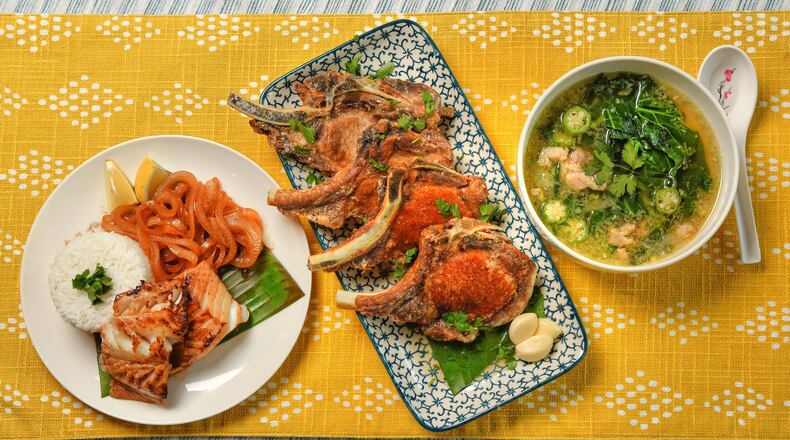Filipino food has never sustained much attention in the continental U.S. despite ties that date to 1898, when Spain ceded control of its Pacific colony to the U.S. That’s curious, because the cuisines of both countries resemble an evolving stew layered with the flavors of the cultures that it encounters.
The Filipino kitchen incorporates ingredients indigenous to its 7,641 islands, and methods of preparations particular to regions within the three central island groups of Luzon, the Visayas and Mindanao. But influences extend beyond the archipelago, to neighboring countries of Malaysia and Indonesia, to China, India, and Arabian nations, thanks to trade.
More than 300 years under Spanish rule, the majority spent under jurisdiction of the viceroyalty of New Spain in present-day Mexico City, brought Iberian and New World staples such as garlic, olive oil, tomatoes and tubers. U.S. soldiers are credited for introducing Filipinos to hot dogs, hamburgers and ice cream, and shelf-stable canned goods like Spam and evaporated milk before the occupation ended in 1946 and the Philippines gained independence.
Put it all together and you get a veritable East-meets-West melting pot punctuated with salty, sour, spicy and savory notes, sometimes pungent and porky, too. For Filipino Americans, including those living in Atlanta, settling a fix for familiar flavors is rare outside the family setting.
Credit: Chris Hunt
Credit: Chris Hunt
“Buford Highway has anything else you could practically want. I was surprised to see there was no Filipino food there,” said Mike Pimentel of Filipino pop-up Adobo ATL, whose job transfer with Delta brought him from New York to Atlanta in 2014.
“As big as Atlanta is, no single Filipino restaurant ever survived,” echoed Amor Mia Oriño, who grew up in Manila and moved to the U.S. to attend graduate school. After relocating to Atlanta from Washington, D.C., a few years ago, she launched Filipino pop-up and catering business Kamayan ATL with her fiancé Carlo Gan.
Credit: Chris Hunt
Credit: Chris Hunt
These fledgling culinary ventures have both relied on Instagram (@Kamayan_ATL and @Adobo.ATL) to accrue a following eager to chow down on chicken adobo, party trays of pancit (soy sauce-laced rice noodles intertwined with bits of meat and vegetables) and fried egg rolls known as lumpia.
“Atlanta is a place that they are willing to try, and if they fall in love with the food, they put it in their rotation,” Oriño said.
Credit: Chris Hunt
Credit: Chris Hunt
Hope Webb and Victor Cortado sure hope so. Last month, the business partners opened Filipino restaurant Estrellita at 580 Woodward Ave., in Grant Park. Although currently only open for takeout due to the pandemic, Estrellita prepares traditional Filipino recipes that Cortado’s mother, Florida Cortado, learned in her native country.
Estrellita may have roots in the Pacific, but these children of immigrants are culling from their experiences growing up in the U.S. (Webb in Florida, Cortado in New York) to distinguish their restaurant from failed Filipino restaurants of yore.
“A lot of restaurants weren’t anything that had a nice atmosphere,” said Webb. “They were more cafeteria-like.” When Estrellita opens its dining room, it will be sit-down service with a full bar.
Credit: Chris Hunt
Credit: Chris Hunt
It’s a similar story for Pimentel. “A lot of my recipes are influenced or inspired by the food I grew up eating at home, but I don’t want to mislead people into thinking that I grew up in the Philippines. I grew up here. I want my food to reflect that it tastes of my own experience of other foods, other cultures.”
WHERE TO SHOP
Find common Filipino staples at these metro Atlanta stores:
Buford Highway Farmers Market. 5600 Buford Highway NE, Doraville. 770-455-0770, Facebook: BufordHighwayFarmersMarket.
First Oriental Market. 2774 E. Ponce de Leon Ave., Decatur. 404-377-6950.
H-Mart. Various locations. hmart.com.
Manila Mart. 5938 Buford Highway NE, Doraville. 678-389-8595, manilamart.business.site.
Your DeKalb Farmers Market. 3000 E. Ponce de Leon Ave., Decatur. 404-377-6400, dekalbfarmersmarket.com.
RECIPES
Vinegar, soy sauce and chiles — with a side of jasmine rice — are hallmarks of Filipino cooking. You’ll see these ingredients in these recipes that also bear the accent of the cook — be it a Filipino native or one who grew up in the U.S.
Credit: Chris Hunt
Credit: Chris Hunt
Suam Na Mais (Filipino Corn Soup)
Mike Pimentel of Adobo ATL pop-up says his approach to cooking reflects his Filipino heritage and his upbringing in the U.S. This recipe for corn soup is one he grew up eating in the summertime. “Usually, there is pork belly or pork shoulder,” he said. Since moving to Atlanta in 2015, he has added more produce to the soup, including collard greens and okra, both used in this version.
Credit: Chris Hunt
Credit: Chris Hunt
Bistek na Isda (Sauteed Cod with Onions)
“Bistek is normally done with beef. I also cook it a lot at home with fish,” said Mike Pimentel of Adobo ATL. “Any white fish works pretty well. Using cod, tilapia, sea bass or trout, it cooks in about 30 minutes.”
Credit: Chris Hunt
Credit: Chris Hunt
Fried Adobo Pork Chops
“I don’t know if it’s Filipino or not,” said Mike Pimentel of Adobo ATL of this dish that his Filipino mother frequently prepared for their family during his upbringing in New York. “It starts Filipino where we use a lot of garlic and vinegar, braise the pork chops, then bread and fry so it becomes crispy but has the taste of adobo.”
Credit: Chris Hunt
Credit: Chris Hunt
Bicol Express
Bicol Express, also known as sinilihan, is a Filipino stew that combines pork, chiles and coconut milk. ”It’s a very versatile dish,” said Amor Mia Oriño of Filipino pop-up and catering business Kamayan ATL. The pork can be swapped for shrimp or meaty fresh produce like kabocha squash, young bamboo shoots, winged beans (or other green bean, such as yard long beans) or young green jackfruit. “Whatever is in season, you can put in. It can morph into a Southern dish,” she said.
Credit: Chris Hunt
Credit: Chris Hunt
Chicken Afritada
Chicken afritada is a Filipino tomato-based stew with chicken, carrots, potatoes and bell peppers. This version of the comfort dish hails from Florida Ollero Cortado, mother of Victor Cortado, co-owner of Estrellita Filipino restaurant.
Read more stories like this by liking Atlanta Restaurant Scene on Facebook, following @ATLDiningNews on Twitter and @ajcdining on Instagram.
About the Author
The Latest
Featured











